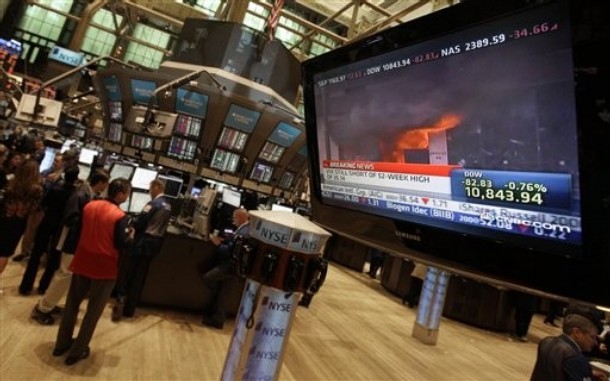
It has long been an axiom that, "When America sneezes, the world catches a cold." But, in the era of globalization, it works both ways.
AP business writer Tim Paradis:
Stocks plunged Thursday as investors succumbed to fears that Greece’s debt problems would halt the global economic recovery. The Dow Jones industrials slid almost 1,000 points before recovering to a loss of 328.
The sudden drop was a painful flashback to the worst days of the 2008 financial crisis. Computer programs intensified the selling while investors watched protests in the streets of Athens on TV. Fears are running high in the financial markets that the Greek government will not be able to implement austerity measures that would enable it to contain its debt problems. And, in turn, that the country’s problems will hurt other economies in Europe and even the U.S.
The Dow’s gyrations showed the high emotions in the markets. Down 998.50 points in mid-afternoon, it recovered less than an hour later to a loss of 328. Meanwhile, interest rates on Treasurys soared as investors sought the safety of U.S. government debt. The yield on the benchmark 10-year note, which moves oppoosite its price, fell to 3.37 percent from late Wednesday’s 3.54 percent.
This defies the expectations reported yesterday by WSJ‘s Bob Davis and Mark Gongloff:
Investors and policymakers are starting to worry that the economic crisis in Greece could cross the Atlantic and undermine the U.S. economic recovery, in the same way that U.S. housing woes in 2008 battered Europe.
"What we have seen is that contagion"—economist-speak for a spreading crisis—"has gone global," says Harvard University economist Jeffrey Frankel.
[…]
There are a number of ways that a crisis in Greece can spread to the U.S., say economists, though most would require Greece’s problems to jump first to larger European countries, such as Spain and Italy. By itself, Greece is far too small to have much effect directly on the U.S. Its economy is about 2% the size of the U.S.’s and it takes in less than 0.1% of U.S. exports.
The problem with that, as today’s stock performance shows, is that investors are betting on the future and therefore have to think a few steps ahead. So, while Greece’s woes by themselves aren’t that big a deal, the likely ripple effects have to be factored in.
Atlantic Monthly business and economics editor Megan McArdle, meanwhile, speculates on what happened today. Among her theories:
- The market knows something that we don’t about Germany. Now that Greece has passed its austerity plan, the rest of the eurozone has to go along. Germany, the single biggest player, votes tomorrow, and maybe someone knows we’re headed for a nasty surprise.
- The market knows something that we don’t, but ought to, about Greece. Greek approval of the austerity plan should have perked things up. Instead, the markets are in turmoil. And maybe they’re right to be. Passing an austerity plan doesn’t guarantee that it will work; Argentina was going through governments like paper plates right before it terminated the dollar peg and defaulted.
- The market doesn’t know anything we don’t, but some idiots panicked when Mohamed El-Erian said that Greek contagion was on the verge of spreading. One of the more comforting explanations; if so, the idiots seem to have thought the better of it.
We’ll soon see what Germany does, I suppose, although it’s hard to believe they’ll balk at this stage.
It’s also worth noting that, even before the Dow fall, the crisis in Greece has caused a sharp decline in the value of the Euro, which makes it even harder for American goods to be sold in Europe, thus further putting the brakes on our recovery.
Interestingly, economists Peter Boone and Simon Johnson argue, the further devaluation of the Euro may be the only realistic route out of the present crisis.
1. Talk down the euro – moving towards parity with the US dollar would help lift growth across the eurozone.
2. As the euro falls, bond yields will rise on the eurozone periphery. This will create episodes of panic. Enough short-term financing must be in place to support the rollover of government debt.
3. Once the euro has fallen a great deal, announce the ECB will support the euro at those levels (i.e., prevent appreciation, with G20 tacit agreement), and also support the peripheral eurozone nations viewed as solvent by buying their bonds whenever markets are chaotic.
4. At that stage, but not before, the eurozone leadership needs to push weaker governments to restructure – that will include Greece and perhaps also Portugal? Hopefully, in this scenario Spain can muddle through.
5. European banks should be recapitalized as necessary and have most of their management replaced. This is a massive failure of euro groupthink – including most notably at the political level – but there is no question that bank executives have not behaved responsibly in a long while and should be replaced en masse.
None of that’s particularly cheery. Then again, I haven’t found analysis on the situation that’s simultaneously encouraging and plausible.
James Joyner is managing editor of the Atlantic Council. Photo credit: AP.
Image: greek-riots-dow-plunge.jpg
